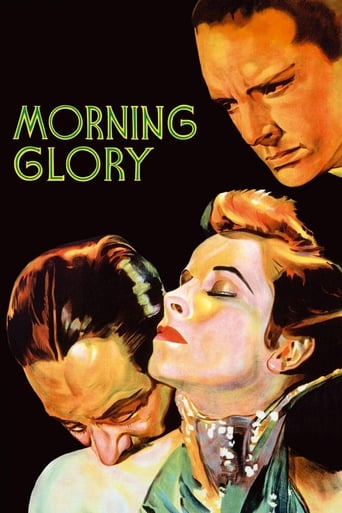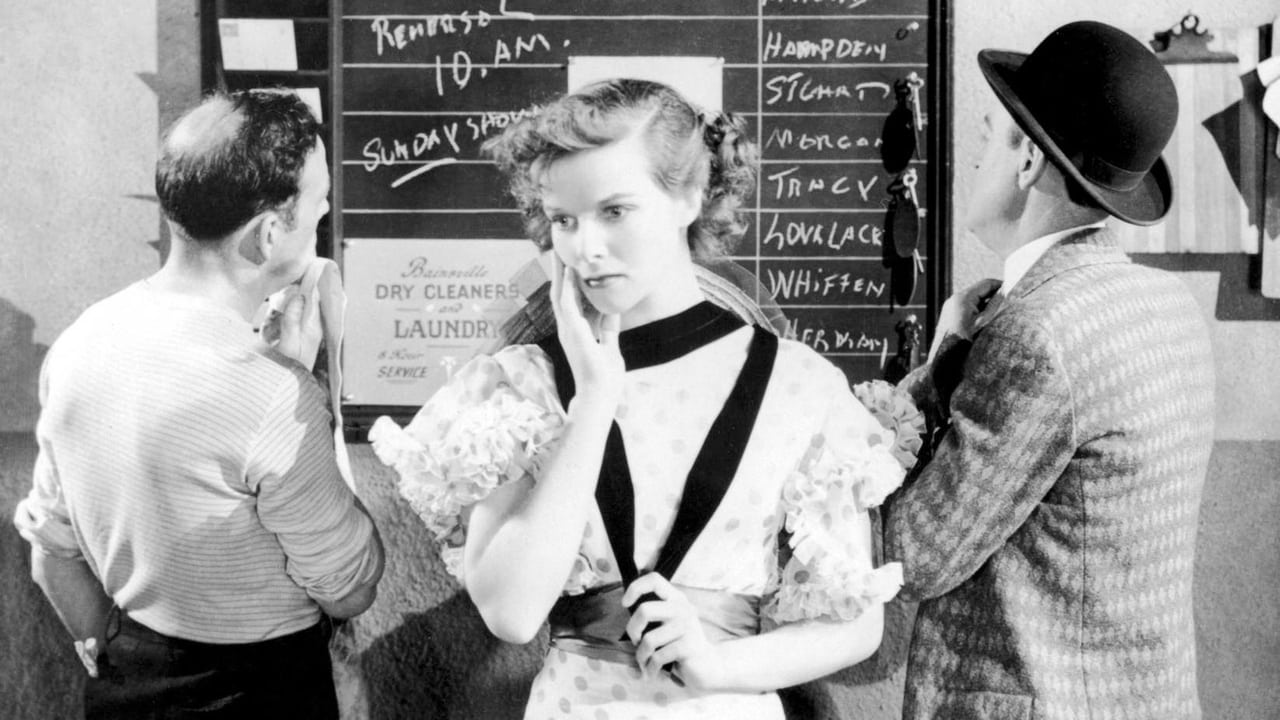jacobs-greenwood
Katharine Hepburn won the first of her record four Best Actress Academy Awards playing an actress; one from a small town, with stars in her eyes, that makes her way to New York to be a star.When first we see her, she is wistfully admiring the paintings hung on the walls of a theater lobby of Ethel Barrymore, Sarah Bernhardt etc.. She makes her way to the offices of a successful producer she'd heard of, Louis Easton (Adolphe Menjou). He is conspiring with his writer/friend Joseph Sheridan (Douglas Fairbanks Jr.) to get Rita Vernon (Mary Duncan), an actress they work with, to do a mediocre play and ultimately star in one of Sheridan's plays.At the same time, in Easton's office reception area, Eva Lovelace (Hepburn) meets Hedges ( C. Aubrey Smith), a character actor who's also hoping to get a part in the play. Eva's "don't take no for an answer" appeal charms Hedges into "taking her on" as a student, for future payment, and her persistence also enables her to meet Easton and Sheridan.After an indeterminate amount of time has passed, we learn that Eva got a chance to play a small part in an Easton production, did not do well, and is now literally a "starving artist" living in the streets. After a successful opening night of a different Easton play, Hedges finds Eva in a small coffee shop and insists on helping her home. However, since he was on his way to a party at Easton's place, he takes her there instead.There she meets several famous people including another producer and a critic, while getting rather inebriated herself. Her true personality and her persistent outgoing nature lead her to perform a scene from Romeo and Juliet in front of the partygoers, causing Sheridan to fall for her. However, she passes out in Easton's lap and, later, spends the night with him. The next morning, not realizing Sheridan's infatuation with her, Easton tells him what happened and asks him to help him get rid of his one night stand.But, never fear, all will turn out O.K. in the end. A happy Hollywood ending using a "much duplicated since" plot vehicle will bring "us" what we all want.
MARIO GAUCI
When Katharine Hepburn first appeared on cinema screens, she was deemed a great new star, even winning an Oscar – for the film under review – almost instantly; however, before long, audiences had grown tired of her particular brand of histrionics and the actress was quickly declared "box-office poison"! She then wisely changed pace to screwball comedy with Howard Hawks' BRINGING UP BABY (1938), was subsequently handed a once-in-a-lifetime part on a silver platter (by playwright and personal friend Philip Barry, no less!) with "The Philadelphia Story" (superbly filmed by George Cukor in 1940), eventually became an institution when she teamed up (for 9 films and in real life) with Spencer Tracy, and ultimately grew into the "First Lady of Acting" – going on to win 3 more golden statuettes, a record, several years after her first! But, for what it is worth, it all started here...Truth be told, I have never been much of a fan of Hepburn's – though I concede that she has appeared in many a fine film throughout her lengthy career. Anyway, the role she plays here fits her like a glove i.e. that of an ambitious young actress rising to the top out of pure chance and sacrificing stardom for love (indeed, the title is a trade phrase for such meteoric members of the profession). Actually, the narrative is not quite as maudlin as it appears from this plot line – and, yet, the brief 74-minute running-time does not give it much of a chance either: we are told that Hepburn seeks acting lessons from aged luminary C. Aubrey Smith (but we never see them at it) and, crucially, her crowning achievement on the stage is only represented by the enthusiastic applause of the audience and the bows she takes at the curtain call!! That said, her thespian skills are displayed in a drunken party sequence at the home of her producer (Adolphe Menjou, with whom Hepburn would be reunited for another classic about the artistic vocation i.e. STAGE DOOR {1937}), where she dutifully quotes a couple of Shakespearean perennials ("Hamlet", "Romeo And Juliet")! For the record, director Sherman had himself been a prominent actor (his most notable appearance perhaps being that of the washed-up film director in Cukor's WHAT PRICE Hollywood? {1932}) who briefly made the switch behind the camera before his untimely death in 1934.The afore-mentioned STAGE DOOR was characterized by the bitchiness among the myriad female performers, here represented by the original temperamental (and blackmailing!) star of the production which ultimately gives understudy Hepburn her one shot at glory. The heroine (which, at a low ebb in her striving to make it on her own, is reduced to appearing in vaudeville!) is infatuated with the much older Menjou (who quashes her romantic illusions by stating that she now belongs to no man but to Broadway alone, a line which has since become a cliché in this type of film!); consequently, she overlooks the attentions of love-struck young author Douglas Fairbanks Jr. (playing a character named Joseph Sheridan!). In the film's closing moments, after finally confessing his feelings to her but ready to back down so as not to be in the way of her success, she is persuaded to make the right choice for herself (obviously, happiness) by the company's elderly personal assistant – herself a former leading light of the so-called "Great White Way" but whose single-minded pursuit of fame had rendered lonely and bitter! It must be pointed out that MORNING GLORY would be remade 25 years later by Sidney Lumet: renamed STAGE STRUCK, it was still good but inferior overall, and starred Susan Strasberg, Henry Fonda, Christopher Plummer and Herbert Marshall.
hcoursen
The TCM version had three confusing glitches. The first, as noted, was that "small part" that keeps getting mentioned, in which Eva failed. but the new play is just opening, so there's been no time for Eva to have done this. Then, she floats out of Menjou's apartment after a one-nighter believing that he and she are soulmates. Are we to believe that she is putting on an act for Fairbanks? The transition to her scrubby career as part of a barrel-rolling team is not charted. Then she turns up as the understudy in the new play, but apparently has had no contact with the impresario, Menjou. Impossible. When Menjou tells her that they are not soulmates, she simply replies "I understand" and goes on from there to cry to the moon that she won't be a morning glory. She's good in her transition from the dull Hamlet clichés to a really strong Juliet -- the quality of the two speeches is nicely contrasted. C Aubrey and Ware are wonderful in the believable roles of people who have fallen from the firmament of stardom. The film itself, though, has the "written" sense and the static sets of a filmed play, which this one is. Oscar? It must have been a bad year!
Neil Doyle
Maybe it's the force of KATHARINE HEPBURN's eagerness to please that makes MORNING GLORY stay fresh, at least for the first part of the film where she plays a naively ambitious stage actress who charms ADOLPHE MENJOU and DOUGLAS FAIRBANKS, JR. into giving her her first big break on stage, as Eva Lovelace.But the film itself is as dated in its pacing and rather abrupt ending as anything you might expect from the 1933 era of film-making. Hepburn's character arrives at a certain point in her development and then suddenly the curtain falls and we don't know whether she indeed was just a "morning glory" who faded after quick success.Hepburn is attractively photographed and does well in a role that was tailor-made for her talent, and Menjou and Fairbanks, Jr. are similarly well cast opposite her--but I much prefer the Hepburn of STAGE DOOR to the character she creates here.Summing up: Has the look and feel of a stage play all the way through. Did Hepburn deserve an Oscar for this? I don't think so.



 AD
AD


